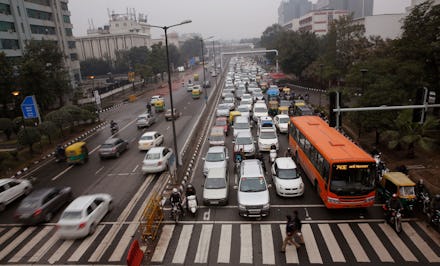We can halve greenhouse gas emissions by 2030 — but it's going to require huge social change

Reducing the amount of the world's greenhouse gas emissions isn't an impossible task. In fact, researchers with the Exponential Climate Action Roadmap initiative believe we currently have the means to cut these emissions in half by 2030. But it's not something we can do alone. It will take the strength and determination of social movement to encourage adjustments to our behavior and the adoption of sustainable technology.
In a report called the Exponential Roadmap, climate experts from around the world have pinpointed 36 ways mankind can halve greenhouse gas emissions by 2030. By cutting emissions by half, the scientists hope that the health risks that come with climate change will also be reduced. Adjustments will have to be made in all aspects of life, however, which is where the difficulty lies.
The report suggests changes in various areas including the energy, transportation, and food production industries. Most urgently, researchers recommend a massive switch to using alternative sources of energy that don't rely on fossil fuels. The experts believe this is within our capability and better for consumers in the long run since solar and wind power have become cheaper. The Guardian reported in March that 75 percent of U.S. coal production is now more expensive than electricity generated from renewable sources, and that the coal industry could be overtaken by 2025. According to the Exponential Roadmap, switching from fossil fuels to renewable energy can quickly halve the emissions generated from electricity production.
Emissions created through transportation could be reduced if more people switched to electric vehicles. Lowering the amount of carbon dioxide in the atmosphere can be accomplished by ceasing deforestation when possible, pushing reforestation efforts, and better land management. Consumer behavior can contribute to this as well — reducing how much red meat and ultra-processed foods we eat can discourage deforestation practices that are done to make room for ranchers. Better land management can also introduce more sustainable farming techniques that will still grow enough healthy produce for the public.
It may seem like a lot to push for within 10 years, but the researchers behind the report believe it's all within our grasp.
"While this scale of transformation is unprecedented, the speed is not," report author Johan Rockström said to The Guardian. "This is now a race against time, but businesses and even entire industries have made many significant transitions in less than 10 years."
Ongoing social movements for climate change awareness have also brought the public's attention to global warming, which further demands the attention of businesses and local governments. Events like the Global Climate Strike are making politicians and corporations consider the push for sustainability. Former head of the U.N. Framework Convention on Climate Change, Christiana Figueres, believes this means society is ready to make a lifestyle adjustment.
"I see all evidence that social and economic tipping points are aligning," said Figueres in a statement. "We can now say the next decade has the potential to see the fastest economic transition in history." By making that transition, countries would be able to see their greenhouse gas emission levels go down without taking a huge hit to the overall economy — all while helping the Earth.